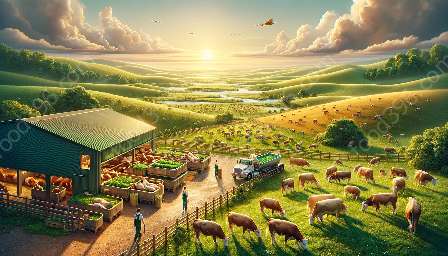Animal welfare standards in meat production play a crucial role in ensuring the ethical and humane treatment of animals throughout the meat production process. The consideration of animal welfare in meat production is a complex and multifaceted issue, encompassing various aspects such as housing, transportation, handling, and slaughter practices.
In recent years, there has been a growing awareness and demand for higher animal welfare standards in the meat industry, driven by consumer concerns about the treatment of animals and the impact of meat production on the environment. This has led to increased attention to the welfare of meat animals and the development of standards and regulations aimed at improving their well-being.
The Importance of Animal Welfare in Meat Production
Animal welfare is integral to the ethical and sustainable production of meat. By prioritizing animal welfare, producers can improve the overall well-being of animals, reduce stress and suffering, and ensure the delivery of high-quality and safe meat products to consumers. Additionally, ethically produced meat can help build consumer trust and confidence in the meat industry.
Furthermore, animal welfare considerations are essential for addressing environmental and societal concerns associated with meat production. By implementing humane and sustainable practices, the meat industry can mitigate its environmental impact and contribute to the promotion of responsible and ethical meat consumption.
Meat Animal Welfare Standards and Regulations
Various organizations and regulatory bodies have established guidelines and standards to promote animal welfare in meat production. These standards encompass a wide range of practices and protocols aimed at ensuring the well-being of meat animals at every stage of their lives, from birth to slaughter.
Common welfare standards focus on factors such as providing adequate space and shelter, access to clean water and nutritious feed, veterinary care, humane handling during transportation and slaughter, and the prevention of unnecessary pain and suffering. Additionally, standards may include requirements for the training and certification of personnel involved in the care and handling of meat animals.
Advancements in Meat Science and Animal Welfare
Advancements in meat science have contributed to the development of innovative technologies and practices that impact animal welfare in meat production. Researchers and industry professionals continue to explore new methods for enhancing the welfare of meat animals and improving the efficiency and sustainability of meat production.
For example, the use of advanced monitoring and management systems can enable producers to track and optimize animal welfare parameters, such as health, behavior, and environmental conditions. Additionally, advancements in genetics and breeding techniques can lead to the development of animal breeds that are better adapted to specific production environments, thereby promoting animal welfare and overall production efficiency.
The Role of Technology in Enhancing Animal Welfare
Technology plays a significant role in supporting animal welfare standards in meat production. From precision nutrition and automated health monitoring to improved handling and transportation systems, technological innovations offer practical solutions for addressing welfare challenges and improving the lives of meat animals.
Furthermore, advancements in data analytics and artificial intelligence enable producers to make informed decisions regarding animal welfare management, resource utilization, and overall process optimization. By leveraging technology, the meat industry can enhance transparency, traceability, and accountability in animal welfare practices, ultimately benefitting both the animals and consumers.
Conclusion
Animal welfare standards in meat production are a fundamental aspect of ethical and responsible meat production. By prioritizing animal welfare, the meat industry can uphold its commitment to ethical practices, meet consumer demand for humane treatment of animals, and contribute to a more sustainable and environmentally conscious food system. Advancements in meat science and technology continue to drive progress in animal welfare, paving the way for a future where the well-being of meat animals is safeguarded throughout every stage of the production process.

